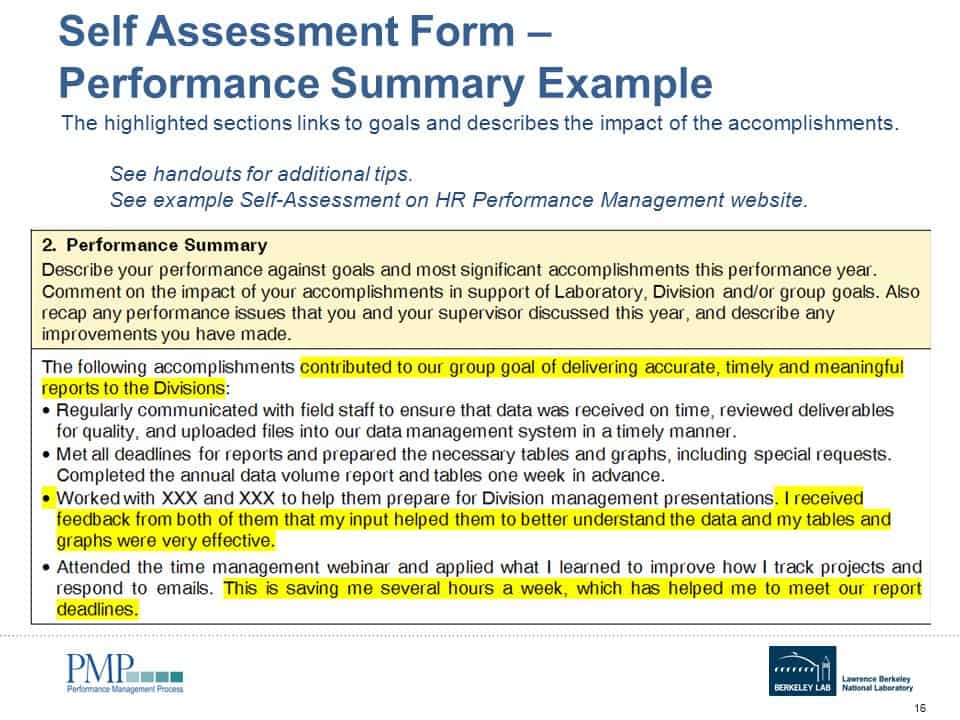Times are changing. Evaluation is no longer a process that is just done by the supervisor. The employees are also required to assess their work and performance, in the form of self-evaluation. That, in combination with the supervisory evaluation and other formalities, forms a part of the company’s appraisal policy.
A performance evaluation is not just an evaluation and assessment by the employer and HR. It also includes self-evaluation or self-assessment by the employees themselves.
A good self-evaluation has multiple benefits. In this blog, we are going to talk all about it and how you can guide your employees to evaluating themselves efficiently.
What is Self Evaluation?
Self-evaluation, also known as a self-assessment or self-appraisal, is a process where the employees evaluate their own performances. It requires them to analyze their strengths and weaknesses so that they can perform better.
Here are three important questions that the employee needs to ask themself while writing a self-assessment.
- What should I keep doing?
- What should I stop doing?
- What should I start doing?
Correctly answering these three questions can clear a lot of things, both for the employee at the time of self-assessment and the subsequent assessors.
In today’s scenario when organizational structures are multifaceted and multigenerational, competition is high. Self-evaluation plays an even more important role as assessing one’s performance gains relevance.
But, is that the only reason self-evaluation is important? No. Let’s find out why self-appraisal or self-evaluation is important.
Why is Self Evaluation Important?
If you know the answer to this question, you’d know why HR conducts self-evaluation practices for employees. You ought to know the importance of it. Here are a few reasons:
Ownership
Employee self-evaluation gives them a sort of ownership at work. This indirectly means they are more accountable for the work they do. Indeed, managers are not absolved of their responsibilities and they are still the ones overseeing the work of the employees, but self-evaluation makes the latter more responsible.
Motivation
Self-assessment also gives a sense of motivation to the employees. Employees feel empowered as they feel they matter and they are no longer seeing the company grow from the background. Self-evaluation gives the employees the chance to play at a level field, identify their issues and talk in a more confident tone about them. This also leads to more confident one on one discussions and fruitful review meetings.
Better Relationships
Employees who are more self-aware when it comes to their professional shortcomings and know how to deal with them are also the ones who manage to foster better relationships with their teammates, including their supervisors and subordinates. Self-evaluation plays a huge role in boosting their morale, thereby improving their communication skills.
Growing Career
Self-assessment also helps the employees in improving their career trajectory as they are aware of their strengths and weaknesses and also how they can harness the former to minimize the latter. This can help them look for better opportunities in the future, whether within the organization or outside it. This also helps the employees assess what exactly they are looking for, which directly affects the way they discuss their roles at the time of appraisal meetings.
No discrepancies
Last but not the least, self-evaluation is a great way to minimize any sort of discrepancies that may arise due to miscommunication or distorted employer-employee relationships. Separate evaluation forms submitted by both the manager and the subordinate help the evaluation process where the manager may better understand where it is that they are differing from their subordinate when it comes to assessing and evaluating the performance. This helps remove any communication barrier, which, of course, leads to better relationships and performances.
What are the Steps to Writing a Good Self Evaluation?

Writing a good self-assessment may seem easy, but requires a lot of skill and finesse. That’s why you need to guide your employees on how they can write one in the best way possible. Here are the steps.
Goal Identification
There are usually two types of goals per employee; the ones that are assigned to them and the ones attached to them personally by their managers. The employees need to identify both with the manager for a good self-evaluation and then set SMART goals for themselves.
Few good examples of personal goals are being better at time management, improving communication skills, etc. The employee should be able to discuss anything that they wish to improve to refine one’s professional skills, whether or not it is related to the organization.
Assigned goals, on the other hand, refer to their assigned tasks or KPIs and are related to the job at hand. A part of self-evaluation also requires the employees to know where they are falling short when it comes to achieving these goals as well.
The overall goal is to identify the goals. This is the first and foremost thing to do while drafting a self-evaluation.
Review Comparison
It is always good to measure growth with respect to a certain parameter. In terms of self-evaluation, the best possible parameter is the last evaluation process. The employee should compare and measure growth since the last appraisal and evaluation process and figure out what has been achieved and what remains.
Managers cannot remember the pitfalls and strengths of each team member. It thus falls on the team members to evaluate themselves correctly. And the best way to do it is by comparing their last self-evaluation report with the current one. This helps them know what they have worked on during the year and what they need to do when it comes to achieving personal or assigned goals (as discussed above).
This is also a great exercise for the employees to know if or not a certain solution worked for them. If not, they can put that forth in the current review so that a new solution can be found.
Growth Plan
Companies nowadays have an array of Employee Development Plans that aim to help employees do their work better and be in a cycle of continuous improvement. But, what about the employees themselves? Encourage the employees to come up with their growth plan based on their growth trajectory. Ask them to share their strengths, weaknesses, and a way to come around the same.
This will help the management in coming up with customized courses and plans that can help each employee rather than a one-size-fits-all approach which is more of a formality than a fruitful solution.
Company and Personal Core Values
Another important part of employee self-evaluation is combining personal core values with that of the company. As we have already mentioned, it is important for the employees to not only work on assigned goals but personal goals as well. Similarly, they also need to list down what are their core values and how they sync in with the company’s core values. The reason being, the two need to match to some extent for a good employee-organization relationship. If the core values are drastically different, the next exercise is to find a spot of synergy to mitigate the differences.
Peer Review
Performance appraisal and review is no longer just about the employee and manager. It is also about the team. Hence, it is important what the peers or colleagues think. How difficult or easy is it to work with the said employee? Now, this is the answer that they need to find out and put in their self-evaluation. Yes, in most cases a third party, mostly the HR or the manager is the one asking this question in team review sessions (one on one). But, passing the baton to the employee can prove to be a good reality check, one that goes unfiltered. Agreed, there are chances of them not getting accurate feedback in one go, but over time, this will help employees get better and more honest with each other concerning individual performance, leading to better peer reviews.

Good Self Evaluation Examples or Questions
Here are a few examples of self-evaluation phrases that you can pass on to your employees while training them on how to craft a good one.
Self Evaluation Examples – Communication
- I need to communicate my expectations clearly to my team.
- I should be tactful enough to pass on difficult feedback.
- With my skill set, I need to look beyond just doing a great job and create processes that can be followed by new hires.
- I need to strategize well enough to approach sensitive situations.
- I will appreciate and acknowledge my team and colleagues’ efforts more.
Self Evaluation Examples – Job Performance
- I should like my work and job enough to value it.
- I need to voluntarily participate in company activities and events.
- If I have not been able to measure up in certain tasks and areas, I should figure out the specific percentage.
- I should map out the specific percentage by which I have improved in achieving my personal and assigned goals.
- I should challenge myself and my team to perform better.
Self Evaluation Examples – Reliability
- I should follow up on my own and the team’s commitments to the clients.
- I have to up my efficiency in meeting the deadlines.
- Sometimes I get caught up in minor issues and should prioritize the quality of work and deadlines equally.
- If I am not able to juggle communication and work at the same time, I should figure out specific hours during the day when I answer emails and messages.
- I should introspect my timeliness when it comes to showing up on time and completing work on time.
- I should be prompt when it comes to seeking help and guidance.
Self Evaluation Examples – Innovation
- I should constantly look for ways to improve my work and work process.
- I should list down any ideas or innovations by me that led to a specific increase in my and the team’s performance.
- The solutions I look for should work for everyone and not just myself.
- I have to figure out innovative solutions to overcome the challenges and seek help where I cannot.
- I should approach each challenge with enthusiasm and look for solutions.
Self Evaluation Examples – Growth and Development
- I should start setting personal goals for myself.
- I should update myself and read up on industry trends.
- With my skills, I should look for learning opportunities to create my own curve.
- I should commit myself to my team’s and my own growth and development.
- I should have a long-term plan for my personal and professional growth.
All of these and many other self-evaluation questions are what the employee needs to answer at the time of writing a self-evaluation.
It’s a self-assessment, a 360-degree evaluation of self. That’s what needs to be conveyed to the employee when they are being trained on the assessment technique.
Some Tips for a Good Self Evaluation
It is not that difficult to write a self-evaluation. However, the employee should know certain core tips and principles before submitting the same.
Be Honest
It is important to be transparent and honest about the performance. An exaggerated self-evaluation is of no use. The purpose of self-evaluation is to know one’s shortcomings, rather than write a far-fetched essay on one’s achievements. The employees need to know this.
Be Critical
It is better to criticize yourself rather than be criticized. Encourage employees to look at themselves critically =. This would help them be more accepting of their pitfalls and how to work on those.
Be Proud
Being honest and critical is good, but so is being proud of one’s achievements. Encourage your employees to list down theirs and know exactly what they did right to achieve those numbers. This helps boost their confidence. Self-evaluation is a mix of strengths and weaknesses. Push the employees to not lean heavily towards either and rather create a balance of both while writing their self-evaluation.
Strive for Continuous Growth
The purpose of self-evaluation is to strive towards continuous growth. That’s why companies are continuously coming up with improvement plans and courses for the benefit of the employees. Employees too, via their self-evaluation, show interest in such growth plans and suggest if they need something more to help them grow professionally.
Back Insights with Hard Facts
Statements are far-fetched unless backed by hard claims. Encourage your employees to measure their performances, whether by single tasks or overall percentage attribution to other goals.
Is Self Evaluation a Better Way to Assess Performance?
Not a better one, but certainly a crucial one. A good performance appraisal is a combination of self-evaluation, peer review, manager’s review, and HR’s review. Self-evaluation, however, plays a huge role in boosting the self-confidence of the employees and also helps them realize their professional problems on their own. This self-realization helps them work better. The same can be achieved via manager reviews as well, but self-evaluation has better results.
Does your organization conduct self-evaluation sessions? Do connect with us at @HarmonizeHQ and let us know all about it.





